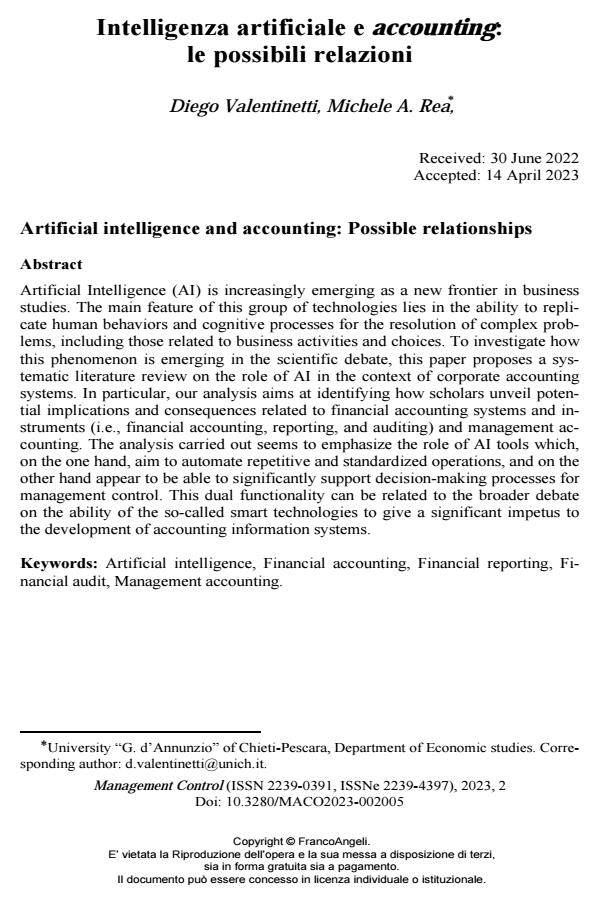Artificial intelligence and accounting: Possible relationships
Journal title MANAGEMENT CONTROL
Author/s Diego Valentinetti, Michele A. Reaa
Publishing Year 2023 Issue 2023/2
Language Italian Pages 24 P. 93-116 File size 280 KB
DOI 10.3280/MACO2023-002005
DOI is like a bar code for intellectual property: to have more infomation
click here
Below, you can see the article first page
If you want to buy this article in PDF format, you can do it, following the instructions to buy download credits

FrancoAngeli is member of Publishers International Linking Association, Inc (PILA), a not-for-profit association which run the CrossRef service enabling links to and from online scholarly content.
Artificial Intelligence (AI) is increasingly emerging as a new frontier in business studies. The main feature of this group of technologies lies in the ability to replicate human behaviors and cognitive processes for the resolution of complex problems, including those related to business activities and choices. To investigate how this phenomenon is emerging in the scientific debate, this paper proposes a systematic literature review on the role of AI in the context of corporate accounting systems. In particular, our analysis aims at identifying how scholars unveil potential impli-cations and consequences related to financial accounting systems and instruments (i.e., financial accounting, reporting, and auditing) and management accounting. The analysis carried out seems to emphasize the role of AI tools which, on the one hand, aim to automate repetitive and standardized operations, and on the other hand appear to be able to significantly support decision-making processes for management control. This dual functionality can be related to the broader debate on the ability of the so-called smart technologies to give a significant impetus to the development of accounting information systems.
Keywords: Artificial intelligence, Financial accounting, Financial reporting, Finan-cial audit, Management accounting.
- Cost analysis for telemedicine services: A scoping review of literature on the cost-benefit approach Luca Del Bene, Cecilia Menegon, in MANAGEMENT CONTROL 3/2026 pp.137
DOI: 10.3280/MACO2025-003007 - The Generative AI Impact Carmelo Arena, Diego Mazzitelli, pp.157 (ISBN:978-1-83549-106-5)
- Dalla misurazione dell'outcome a quella dell'impact: la Sentiment Analysis a supporto della valutazione della performance delle aziende sanitarie pubbliche Christian Di Falco, Guido Noto, Gustavo Barresi, in MANAGEMENT CONTROL 2/2025 pp.157
DOI: 10.3280/MACO2025-002008
Diego Valentinetti, Michele A. Reaa, Intelligenza artificiale e accounting: le possibili relazioni in "MANAGEMENT CONTROL" 2/2023, pp 93-116, DOI: 10.3280/MACO2023-002005